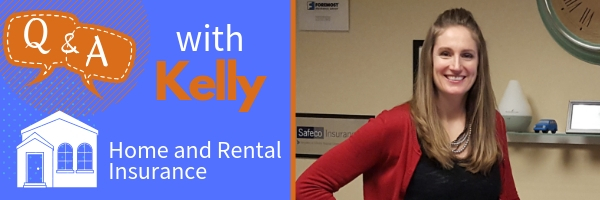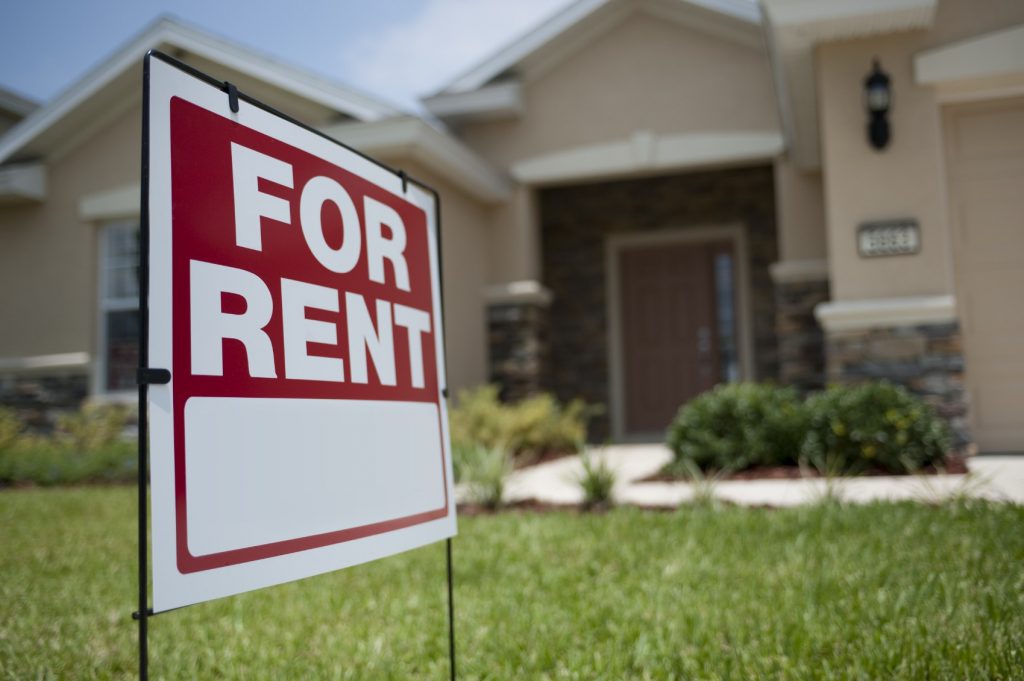Q&A with Kelly-Homeowners and Rental Insurance

Insurance is difficult to understand, whether it’s the confusing descriptions, understanding coverage, or the different types of plans offered. Because of how complicated insurance can be, many people are reluctant to buy it, fearing they’ll make the wrong choice. As an independent agent, I can help navigate you and your family through all of the confusing information presented in plans.
Homeowner’s and Rental insurance policies, for instance, can be difficult to understand. But have no fear, I have compiled some of the commonly asked questions and answers about Homeowners and Rental insurance.

Homeowners Insurance Q&A
Q: What are some practical things I can do to lower the cost of my home insurance?
A: Look for any discounts that you may qualify for. For example, many insurers will offer a discount when you place both your car and homeowners insurance with them. Other times, insurers offer discounts if there are deadbolt exterior locks on all your doors, or if your home has a security system. I can also help you find out bout any discounts that you may qualify for.
Another easy way to lower the cost of your homeowners insurance is to raise your deductible. Increasing your deductible from $250 to $500 will lower your premium, sometimes by as much as five or ten percent.
Q: What does homeowners insurance cover?
A: The typical homeowners policy has two main sections: Section I covers the property of the insured and Section II provides personal liability coverage for the insured. Usually, homeowners insurance is required by the lender to obtain a mortgage.
Q: What is the difference between “actual cash value” and “replacement cost”?
A: Covered losses under a homeowners policy can be paid on either an actual cash value basis or on a replacement cost basis. When “actual cash value” is used, the policy owner is entitled to the depreciated value of the damaged property. Under the “replacement cost” coverage, the policy owner is reimbursed on an amount necessary to replace the article with one of similar type and quality at current prices.
Q: What factors should I consider when purchasing homeowners insurance?
A: Determine the amount and type of insurance you will need. The coverage limit of your house should equal 100% of its replacement cost. If your policy limit is less than 80% of the replacement cost of your home, any payment from will be less than the full cost to replace your home – you’ll have to pay the rest out of your own pocket. Also, decide if the personal property and personal liability limits are adequate for your needs.
Decide which, if any, additional endorsements you want to add to your policy. For example, do you want the personal property replacement cost endorsement, sump pump or sewer back up endorsement, or a jewelry endorsement?
I will be able to help you determine if there are any gaps in coverage that you might not have been aware of, explain the details of the policy’s exclusions and limitations, as well as recommend an insurance company that will live up to your expectations.
Q: What are the policy limits (i.e., coverage limits) in the standard homeowners policy.
A: Note: this answer is based on the Insurance Services Office’s HO-3 policy. The home and other structures on the premises are protected on an “all risks” basis up to the policy limits. “All risks” means that unless the policy specifically excludes the manner in which your home is damaged or destroyed, there is coverage. The policy limit for the home is set by the policy owner at the time the insurance is purchased. The policy limit for the other structure is usually equal to 10% of the policy limit for the home.
Losses to your personal property are covered on a “named perils” basis. “Named perils” means that you have coverage only when your property is damaged or destroyed in the manner specifically described in the policy. The policy limit on the coverage is equal to 50% of the policy limit on the home. Limits for the coverage of additional expenses that the policy owner may incur, when the residence cannot be used because of an insured loss, is equal to 20% of the policy limit on the home. Find out more about coverage options
Q: Where and when is my personal property covered?
A: Personal property (except property that is specifically excluded) is covered anywhere in the world. For example, suppose that while traveling, you purchase a dresser and you want to ship it home. Your homeowners policy would provide coverage for the “named perils” while the dresser is in transit – even though the dresser has never been in your home before.

Renters Insurance Q&A
Q: Why would I want to buy renters insurance?
A: A standard renters insurance policy protects your personal property in many cases of theft or damage, and may pay for temporary living expenses if your rental is damaged. It can also shield you from personal liability. Anyone who leases a house or apartment should consider this type of coverage
Q: How does a renters insurance policy protect my personal property?
A: A renters insurance policy provides named perils coverage. This means that the policy only pays when your property is damaged or destroyed by any of the ways specifically described in the policy. These usually include:
- Fire or lightning
- Windstorm or hail
- Explosions
- Riots
- Aircraft
- Vehicles
- Smoke
- Vandalism or malicious mischief
- Theft
- Falling objects
- Weight of ice, snow, or sleet
- Accidental discharge or overflow of water or steam
- Freezing
- Sudden and accidental damage from artificially generated electrical current
- Volcanic eruptions (but this doesn’t include earthquake or tremors)
Renters insurance coverage applies to your personal property no matter where you are in the world. This means you’re covered when you are on vacation as well as at home.
Q: Why do some apartment complexes require tenants to have renters insurance?
A: Owners of apartment complexes buy insurance policies for their liability in order to cover their buildings and personal property. However, these policies do not cover any of the tenant’s property or liability. By requiring their tenants to have renters insurance, the apartment owner is assured that the tenants will not mistakenly believe the apartment complex owner’s policy will provide coverage for a tenant’s property or personal liability. Although this type of requirement benefits the apartment complex owner, there are benefits for the renter as well.
Q: What if I share my apartment with a roommate? Do we both need to have renters insurance?
A: Standard renter’s policies cover only you and relatives that live with you. If your roommate is not a relative, each of you will need your own renter’s insurance policy to cover your own property and to provide you liability coverage for your own actions.